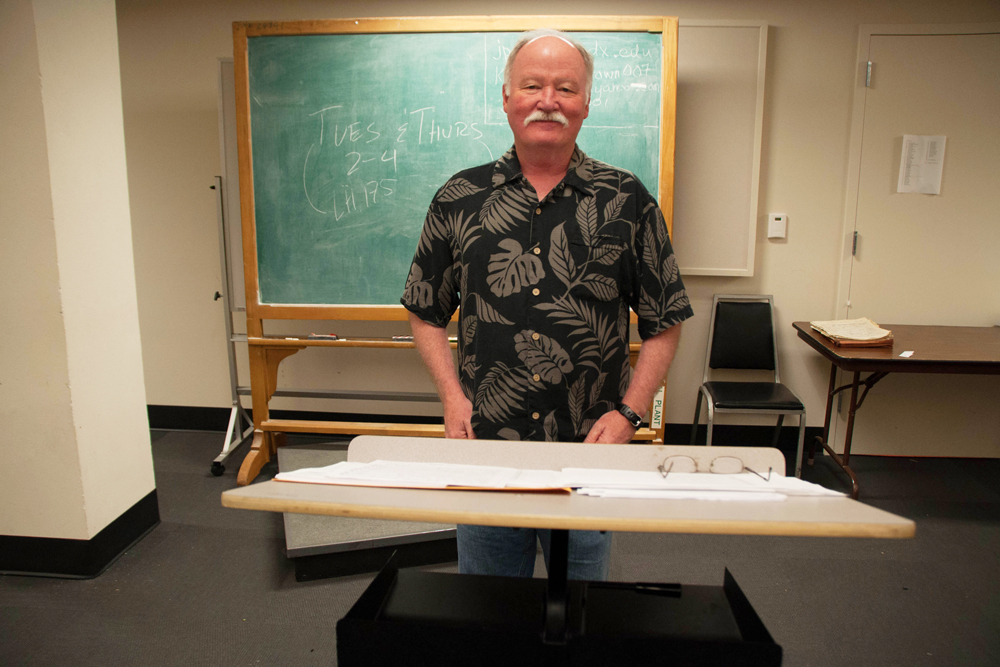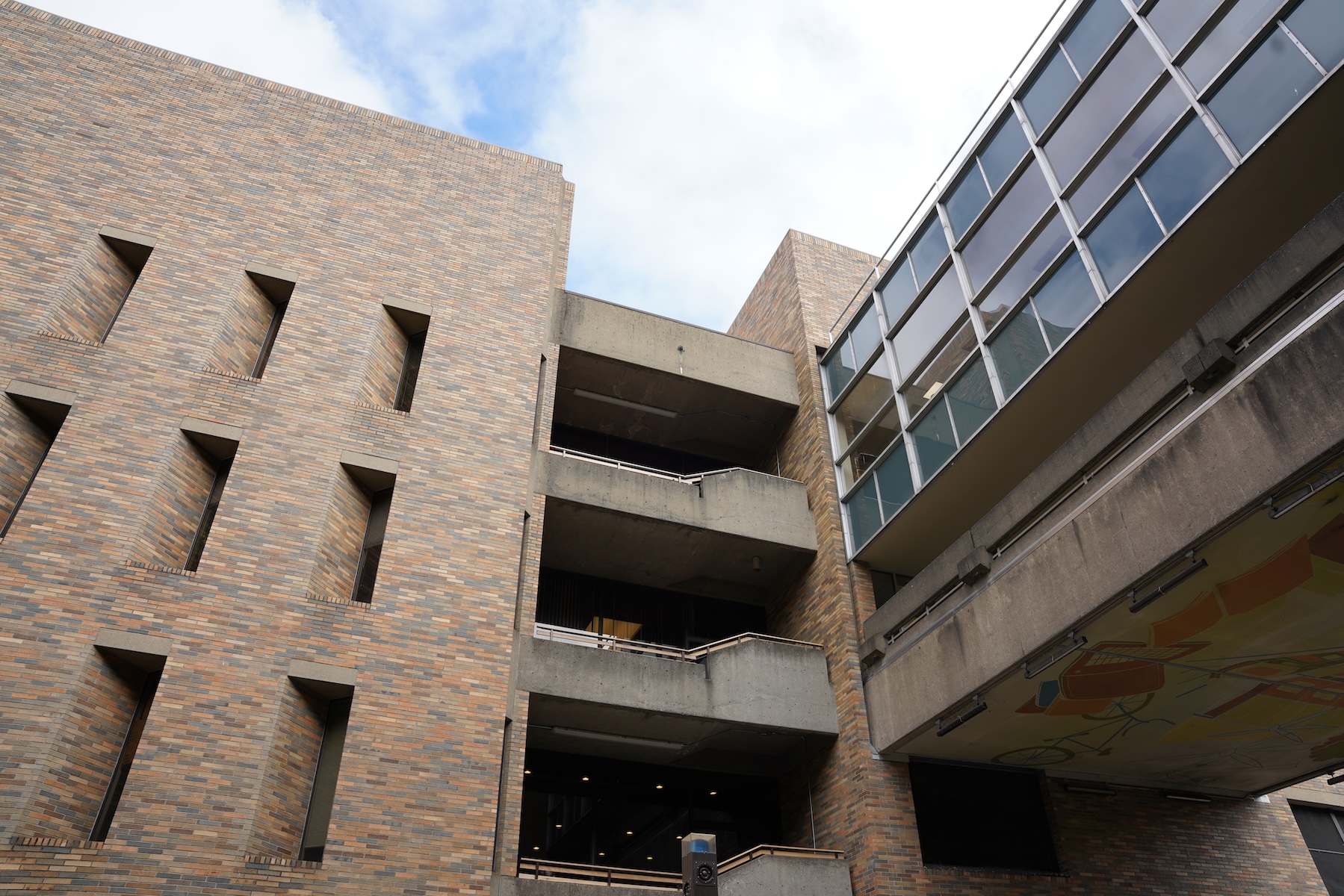There are roughly 2,100 teaching and non-teaching faculty employed by Portland State: adjunct instructors, senior instructors, associate professors, assistant professors, researchers, librarians, attorneys, advisers, tenure track, non-tenure track, temporary and permanent. And they’re all bargaining with PSU this summer.
PSU Faculty Association, the part-time faculty union, will negotiate its entire contract, which expires at the end of June. The PSU chapter of the American Association of University Professors, the full-time faculty union, has begun negotiating several articles within their current contract, which was ratified in mid-2014 after complicated negotiations. The contract will expire in November.
“Students should care, because we care about them,” said Davida Jordan, a PSUFA member and an adjunct instructor in the Intensive English Language Program. “Like they say, our working conditions are their learning conditions.”
Current conditions: PSUFA
According to PSU’s Office of Institutional Research and Planning, there were 695 adjunct instructors and 58 research positions at PSU in Fall 2014. In an email, Carol Hawkins, PSU’s Director of Academic Employee and Labor Relations, said that PSUFA will represent roughly 874 teaching and research faculty in the upcoming negotiations.
Kelly Cowan, an adjunct professor in the engineering department and the president of PSUFA, did not respond to requests for comment.
PSUFA represents all teaching and researching faculty who work less than .5 FTE, which, according to the collective bargaining agreement, is approximately 22 credit hours per year, not including summer term.FTE, or Full Time Equivalency, is a metric used to measure workload.
“That’s a pretty hard and fast rule,” said Edward Taub, organizing director for PSUFA. “Once you get over half-time, [PSU] is liable to pay benefits.”
Currently, adjunct instructors make a minimum of $858 per credit. Taub said it’s rare for someone to receive more than the minimum. For a four-credit class, that’s $3,432. Adjunct instructors are hired on a term-to-term basis.
“We want to make it more known that some people who are teaching you are making a lot more money than the other people who are teaching you, and your quality of education is going to be the same,” Jordan said.
Jordan has taken on a central role in PSUFA in the lead-up to bargaining. She has been working in the IELP on and off since 2007. She currently works at Portland Community College as a part-time ESOL instructor.
PSU, according to the collective bargaining agreement, is required to give adjunct instructors at least five weeks notice for job assignment offers when feasible. Depending on the department, however, that kind of notice is rare, according to Taub and Jordan.
“People don’t step up and take advantage of assignment rights language because they’re afraid,” Taub said. “There’s no job security to begin with, and, you know, in some departments, where adjuncts are really treated like dirt, they’re afraid to step up. In other departments, they’re moving on it because those departments are more reliant on adjuncts and therefore more respectful toward them.”
“I’ve never had five weeks’ notice,” Jordan said. “PCC gives you your classes pretty far in advance. Mt. Hood Community College, Clackamas—they do it a lot farther in advance. They have different constraints, though…partly because we’re dealing with international students [at PSU] versus residents [at community colleges]. But so it’s a gamble. If I get offered a class at PCC, I can say, ‘Well, I want to keep my schedule open for PSU,’ and they’ll say, ‘Okay, cool, thanks, we’re going to give that class to somebody else.’ So it’s like, do I want to wait until the last minute and get a class from PSU, which may not ever materialize? Or do I want to take this PCC class?”
The agreement also allocates $175,000 per year for a healthcare fund. Faculty who want to use the fund may apply only during terms in which they are employed, and the funds are dispersed on the last day of the term.
“The way this health insurance [fund] works, you don’t get the money until the last day of the term, so it’s not that helpful in a way, if you don’t want to live off of credit cards,” Jordan said. “When fewer people knew about it, it was maybe kind of a good deal, but now that more people are learning about it, the amount that everybody gets is shrinking.”
There is a professional development fund of $85,000 per year. Eligible members may apply for a maximum of $2,000 each to put toward research or attending conferences. There is also an educational fund of $45,000 per year.
Members are also encouraged, per the agreement, to participate in departmental committees, but they are not compensated for departmental participation.
“I do it because I love it,” Jordan said. “It’s such a dynamic job. There’s a lot of creativity involved in teaching…working conditions are terrible, but in a way, it’s still worth it.”
Current conditions: AAUP
According to Phil Lesch, the Executive Director of AAUP, the union is representing 1,262 individuals at the time of bargaining. This includes tenured and tenure-track teaching faculty, non-tenure or fixed-term teaching faculty, and non teaching faculty, such as researchers or academic professionals.
Members of AAUP are full-time, teaching or working at .5 FTE (23 credit hours) or more per year. Teaching faculty must not take on more than 36 credit hours per year, no more than 10 percent of which may be from non teaching activities such as research or sitting on committees.
AAUP positions are salaried based on position, rank and FTE. For instance, effective January 2015, a professor with a 12-month appointment working 1.0 FTE will receive a minimum salary of $101,232. That rank and salary, however, only apply to four faculty members at PSU. According to AAUP National’s “Annual Report on the Economic Status of the Profession, 2013–14,” the average salary for a professor at a public doctoral university last year was $126,981.
Faculty working less than 1.0 FTE receive lower salaries in accordance with their workloads. Teaching faculty receive 2.5 percent salary increases from year to year to keep up with inflation. Faculty also receive reduced compensation over summer term.
Michelle Zellers, the Internal Organizer for AAUP, clarified in an email, “The vast majority of employees we represent who have teaching responsibilities work on 9-month appointments (corresponding to the 9-month academic year), and lower minimum salaries apply. In addition, most teaching faculty are not technically (full) professors—even if students commonly refer to them as such. For teaching faculty, minimum salaries range from $41,112 for non-tenure track ‘Instructors,’ to $56,430 for tenure-track ‘Assistant Professors’ to $82,971 for ‘(full) Professors’ who have risen to the highest rank available for tenured faculty, usually late in their careers.”
She continued, “For all ranks, PSU faculty members earn lower salaries, on average, than our peers at ‘comparator’ institutions nationwide.”
AAUP members have access to health care through the Public Employees’ Benefit Board. PSU pays 95 percent of the monthly premium, and members pay the other five percent.
According to the 2015–17 PSU-AAUP Collective Bargaining Issues, “Faculty and academic professionals do not have paid family leave, and current policies are not family-friendly. Out of pocket health care costs are rising, and health incentive programs do not meet the needs of faculty and academic professionals. Academic professionals are unable to take leave and are not reimbursed for leave they do not take.”
AAUP has a professional development fund of $650,000 per year and a $500,000 per year fund for travel related to professional development. Members of AAUP and their families are also offered discounted tuition, according to AJ Brown, an instructor in the IELP.
“[My son] goes to school here at a tremendous discount because I’m a teacher here,” Brown said. “It’s a big benefit if the faculty takes advantage. And so, AAUP just fought and—we just got something… that says it’s not going to change.”
For non-tenure track or fixed-term faculty, contracts are on a 9-month or year-long basis. After four years, fixed-term faculty may earn the right for multi-year contracts. Per the agreement, a minimum of 80 percent of non-tenure track instructional and research faculty with seniority status must be granted multi-year contracts, either two or three years. Multi-year contracts are assigned depending on seniority and rank.
PSU created a joint labor and management task force, per article 18 of the agreement, to examine ways to create indefinite contracts as a means of “providing enhanced job security for longer term, productive and successful non-tenure track faculty that support the needs and demands of individual departments.”
The task force determined that, after a certain amount of time, fixed-term faculty should be eligible for permanent positions, but their recommendations have not been made policy yet.
“There’s just not a ton of security for teachers like me,” Brown said.
Negotiating the past
In a student media press conference on May 22, PSU President Wim Wiewel said he wants to avoid what happened during last year’s negotiations with AAUP, which almost resulted in a strike.
“The way it went last year was not good,” Wiewel said. “There was a lot of stress and tension and antagonism. That’s not good for the institution…it’s not good for anybody.”
“There were just vast differences between the two sides about how to resolve several issues,” said Pam Miller, President of AAUP and a professor in the School of Social Work. “[The administration] wanted to remove some language about promotion and tenure…plus, of course, salary and job security. Last time we wanted job security in terms of having multiple year contracts for more of our non-tenure track faculty. We were really at odds about that last year.”
AAUP and the administration did not come to an agreement in direct bargaining, so they moved to mediation. Janet Gilman, State Conciliator for the Employment Relations Board, mediated between the two parties. That, however, did not result in an agreement, and the two parties came to an impasse. AAUP voted to strike, but the administration and the union eventually came to an agreement.
PSUFA and the administration last negotiated in 2013 and ratified their current collective bargaining agreement in November 2013.
What the unions want
According to the 2015–17 PSU-AAUP Collective Bargaining Issues, AAUP has four bargaining goals including: support for professional development, including increased access to funds and more direct funding in order to fully support their research programs. AAUP also wants retention and recognition of services, which would reward academic professionals, who currently have no room for advancement, for specialized skills. Under retention and recognition of services, AAUP also wants the administration to adopt the joint labor and management task force’s recommended permanent employment policy for fixed-term faculty.
“Let’s have more people who can count on their job for more than a year, and let’s [increase] that,” Miller said.
The third issue AAUP wants to address is a healthy workplace, which would include paid family leave and more family friendly policies for both faculty and academic professionals, a revisitation of the current healthcare system, and better work-life balance. AAUP is also asking for higher summer session pay rates and compensation more on-par with national salary averages.
PSUFA will be negotiating for more money in the professional development and education funds, according to Taub.
“I really think the faculty education fund needs to be reworked and increased,” Taub said. “We have a number of graduate students who are adjuncts, and we’re helping them pay for their graduate education from the faculty education fund…Professional development, we’re in pretty good shape. We zeroed it out, so a small increase there.”
Taub said he would ideally like to see another $50–75,000 in the health care fund. “That would really help, in particular, the higher premium people. You know, those people who are not healthy and have to spend more on health insurance.”
Jordan agreed that the health care fund needs to be increased. “It’s a way to show that adjuncts are valued, to say, ‘Yes, we care about your health care, and if you’re sick, we want you to be able to take care of yourself.’”
Ultimately, Jordan said, she wants to see more job security and more respect for adjunct instructors.
“Having some kind of notification, knowing farther in advance or if you’ll even have a job at all—maybe longer contracts. We want more transparency in the departments: do you move up? Is there seniority for an adjunct? What are you working toward? Once you’re fixed-term, full time, there’s a very clear path and hierarchy of: if you’ve been here for this many years, you get such and such, and this is your title. As an adjunct, it’s kind of like, you’re here or you’re not, nobody’s keeping track. We’d like to feel like there’s a light at the end of the tunnel—like you’re working toward something.”
“Our interests are to create the best possible university that provides high quality education-where tuition is kept as low as possible, where people are fairly compensated, and where [we can] deliver quality education and secure the long-term financial viability of the university,” Wiewel said. “As you can imagine, there is a tension between all of those. It’s always going to be a juggling act.”
Looking ahead
Both unions will be employing Interest-Based Bargaining this time around. Gilman, who helped AAUP and the administration come to an agreement last year, has trained AAUP in IBB and will be present for bargaining this summer.
IBB, according to ERB’s website, “differs from traditional bargaining by starting with interests, exploring options and building toward solutions.”
“IBB brings both teams to the table to discuss interests and options rather than positions,” Hawkins said. Hawkins is on the university’s bargaining team and will provide labor relations and collective bargaining advice and support to Vice Provost for Academic Personnel and Leadership Development in the Office of Academic Affairs and Associate Dean of Humanities and Social Sciences in the College of Liberal Arts and Sciences Shelly Chabon, who is also on the administration’s bargaining team.
Miller said she hopes IBB will help the administration and AAUP understand one another’s positions better and more easily come to an agreement. “It is different in the sense that we can still caucus, we can still disagree, we don’t have to be best friends or anything like that, but it really is not oppositional. It is more about finding common ground to work from in order to make decisions.”
AAUP and PSUFA held a joint rally several weeks ago in order to build a relationship between the two unions.
“The goal is strength in numbers,” Miller said. “We have very similar asks of administration. I don’t want to sugarcoat it and say that there aren’t any differences between the two [unions], because there are, but we’re opening up our bargaining about the same time, and it really makes sense to work together.”
Jordan said she wants the two unions to build empathy, especially since some demands overlap. “We should be working together…We can help each other.”
“Ideally our relationship with both PSUFA and AAUP will be better at the end of negotiations than they are today,” Hawkins said. “Our goal is to build a relationship of trust and respect and a strong and supportive environment for our faculty.”
AAUP has already started bargaining with the university and will continue bargaining throughout the summer. Wiewel said the goal is to finish negotiations with AAUP before the end of the calendar year. PSUFA will start bargaining with the university at the end of the term. Hawkins said PSUFA is aiming for a late June IBB training date.
Updated May 26 at 5:00 pm.






